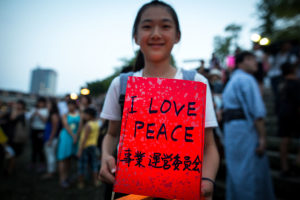Because the first half of the 20th century is thought of in the West as an era of imperial decline, it’s easy to forget that, in these decades, there was one nation whose empire was fast expanding. Japan was on a determined march to become a world player, after more than two centuries of self-imposed isolation. It acquired the island of Formosa, now Taiwan, in 1895, annexed Korea in 1910, and, eventually, ruled most of Southeast Asia. Utterly unprepared to administer such a vast imperial enterprise, Japan sowed confusion and devastation; its colonies were rife with forced labor, sex slavery, torture and biological experiments. Why, then, do we seldom hear about a Japanese post-colonial reckoning — of the kind that we see on campuses across the West?
It is not entirely for want of international pressure. In the spring of 2019, for instance, a new design for a 10,000-yen note featuring a portrait of Japan’s pioneering industrialist Shibusawa Eiichi was announced, provoking a harsh reaction from South Korea — where Shibusawa’s portrait had been briefly used on the currency imposed by Japanese colonial rulers. The nation’s objections were duly reported in Japan, yet little public debate followed. The banknote will be released, as originally planned, in 2024.
This response echoes the better-known controversy over “comfort women”, a euphemism for the hundreds of thousands of predominantly Chinese and Korean women forced to become sex slaves to Japan’s imperial army during the Second World War. Japan’s apparent resistance to engaging fully and sincerely with these historic crimes has inspired much international criticism, including demonstrations outside Japanese embassies in Seoul and Manila.
To understand why Japan is so guarded about its empire, it is necessary to understand how exactly that empire came about. After all, the nation had only narrowly escaped being colonised itself in the mid-19th century, when the industrialised Western powers set their sights on Asian territories. In the 20th, as the first and only non-Western country playing the game of great power politics, Japan tried to adopt the role of the anti-colonial colonialist, predestined to liberate other Asians from Western imperialism and to lead them on the road to progress. Japan’s stated aim was to create “an Asia for Asians”, a slogan it used to justify its own aggressive invasions. China had to be freed from the Western-backed regime of Chiang Kai-shek; Malaya and Burma from the British; the East Indies from the Dutch; Indochina from the French; the Philippines from the Americans. According to this view, Japan’s imperialism was not self-interested — and acted in opposition to Western colonialism.
Race was at the heart of Japan’s Pan-Asianism. Writing in late 1918, Prince Fumimaro Konoe, who would later become prime minister, urged Japan to “reject the Anglo-American Peace” to be proposed at Versailles. Shortly after attending the conference, he wrote: “That the white people — and the Anglo-Saxon race in particular — generally abhor coloured people is an apparent fact, so blatantly observable in the US treatment of its black people.” And his suspicions were arguably vindicated when Japanese delegates tried to have a clause in favour of racial equality included in the League’s charter — and failed.
After the worldwide depression, as the Great Powers became inward-looking — putting up protectionist trade barriers and, in some cases, introducing laws against Asian immigration — Japan’s rhetoric became focused on economic security. The nation insisted that each of its expansionist steps was part of a grand project — to build a “New East Asia Order” or the “Greater East Asia Co-Prosperity Sphere”. The official goal of Japan’s war with the West was declared, in late 1941, to be the establishment of Asian “stability”. Just as the Japanese were taught to believe in their emperor’s divinity, they were also taught that their nation had a sacred mission in Asia — especially in colonial South-East Asia, where the dissatisfaction in European colonies justified Japan’s involvement, for some. For others, it had the opposite effect: in 1962, Lee Kuan Yew, who was then Singapore’s Prime Minister, identified Japan’s military occupation from early 1942 as a wake-up call. Japanese occupation made his generation of young people “determined that no one — neither the Japanese nor the British — had the right to push and kick us around”.
To this day, the belief that ousting the predatory West from Japan’s backyard was morally legitimate persists. In the Nineties, one best-selling manga by the cartoonist Yoshinori Kobayashi, claiming to be a “philosophical comic book”, painted Japanese imperialism in a shamelessly self-glorifying light. The Japanese army, it argued, “bravely fought the white imperialists, who arrogantly regarded coloured peoples as lowly primates”. More recently, the hawkish former prime minister Shinzo Abe’s success was partly down to his effective deployment of neo-nationalist rhetoric, which has remained present since his death.
But whatever the present-day Japanese would like to believe, in practice Japanese occupiers used anti-colonial rhetoric while behaving very much like colonial masters themselves. This led the historian Grant Goodman to observe in 1991 that Japan “out-colonialed” Westerners in terms of brutality and exploitation. In reality, it would be misguided to dismiss Japan’s “Asia for Asians” claim as purely disingenuous, a post facto excuse for its aggressive expansionism. The philosophical underpinnings for it preceded Japan’s empire.
In the late-19th century, Asian intellectuals — often writing in English — sought to reject the colonial view of Asia as an entity that was racially inferior. The Japanese art historian Tenshin Okakura, an associate of the Bengali poet Rabindranath Tagore, emerged as one of the most influential Pan-Asianist voices. Despite its comparative material and military weakness, Okakura asserted, Asia was a civilisation par excellence. In the preamble of The Ideals of the East, he wrote:
“Asia is one. The Himalayas divide, only to accentuate, two mighty civilisations, the Chinese with its communism of Confucius, and the Indian with its individualism of the Vedas. But not even the snowy barriers can interrupt for one moment that broad expanse of love for the Ultimate and Universal.”
And yet, Japan’s quest to reach the status of the white nations that ruled the world was conducted not in spiritual terms but old-fashioned military ones. With Japan’s victory in the war against Tsarist Russia in 1905, it became the first non-white power to defeat a white one in a modern war. Unsurprisingly, this stoked anti-colonial sentiments beyond the Japanese archipelago. Jawaharlal Nehru, writing in 1939, recalled the excitement he felt as a boy: “Japanese victories stirred up my enthusiasm … Nationalistic ideas filled my mind. I mused of Indian freedom and Asiatic freedom from the thraldom of Europe.”
A string of anti-colonialists started to seek refuge in Japan — including Indo-Chinese nationalists Phan Boi Chau and Prince Cuong De, Indian independence fighter Rash Behari Bose, and, most famously, Sun Yat-sen, the father of modern Chinese nationalism. Many of them were morally and financially supported by Japan’s Pan-Asianists. The movie studio tycoon Umeya Shokichi, for example, drew on his fortune to help finance Sun’s nationalist movement, as did Torazo Miyazaki, a philosopher who actively collaborated with the Chinese nationalists by volunteering to be their publicist and supplier of arms, and even a combatant.
Meanwhile, one of the most important figures of 20th-century Japanese literature, the novelist Masuji Ibuse, worked in Malaya and Singapore, writing editorials for the local newspaper. He emphasised the importance of propagating the Japanese language. In February 1942, he wrote, ironically in English:
“The substitution of Nipponese (Japanese) for English as the lingua franca in Malaya is but the natural recognition of a nation which has stood up for things Asia [sic] and which is now in the process of saving Asians from continuing to be the victims of the British strategy to squeeze the wealth and culture of Asians.”
Ibuse was convinced that learning Japanese would elevate other Asians. To him, and many others, Asia was not only one, as Okakura had proclaimed; rather, “Asia was Japan”.
Despite Japan’s utter defeat in the Second World War, this narcissistic self-image persisted. That the emperor was never held responsible for Japan’s imperialism did much to hinder the development of an honest debate: his throne was spared by General Douglas MacArthur out of fear of Japanese rebellion, which would have stifled efforts to rebuild post-war Japan as a fortress against communism. A lingering reverence for the imperial institution has also made Japanese colonialism something of a sensitive — if not a taboo — subject in post-war Japan. The emperor, moreover, has become a symbol of peace in a nation that now hasn’t seen war for a lifetime.
All this partly explains why the West’s post-colonial reckoning has so far elicited no discernible reaction in Japan. There is always a slight time lag before Japan absorbs any social and intellectual movements coming from the outside world. Advocacy for LGBTQ rights, for instance, took some years for college students to embrace. Yet there is a bigger reason why Japan has not reckoned with its colonial past. Whereas in Britain the ideologies used to justify colonialism, including Social Darwinism, have been thoroughly debunked, the imperial Japanese claim that Asia had to be liberated from the West is, in theory, morally unobjectionable. None of this excuses the atrocities committed by Japan in practice. And while most Japanese today are indifferent to the topic of the empire, it’s still a subject that gets conservatives riled up. They stick to the classic narrative of Asian solidarity, in which Japan stood up to the imperial bullies, instead of emulating them.
It is a story that stars Radhaninod Pal, an Indian judge beloved by the Japanese Right. Sitting on the International Military Tribunal for the Far East in 1946, otherwise known as the Tokyo Trial, he became famous for arguing that all the Japanese defendants, including the wartime prime minister Hideki Tojo, should be acquitted. He insisted that Japan’s crimes were hardly unprecedented, that one only had to look at Western imperialism to find equal brutality. He also pointed to America’s nuclear bombings as war crimes, and accused the victorious powers of moral relativism and racial prejudice. Because of such statements, Pal is to this day memorialised in Japan as a brave nationalist who sided with an Asian ally in the face of Western arrogance.
Japan’s pose as the anti-colonial colonialist will persist so long as it continues to think of itself as having fought a selfless, civilisational war for the good of Asia. All the while, an uncomfortable truth will remain ignored: that, in its execution of the Pan-Asianist dream, Japan fell far too short of delivering its grand promises.
Disclaimer
Some of the posts we share are controversial and we do not necessarily agree with them in the whole extend. Sometimes we agree with the content or part of it but we do not agree with the narration or language. Nevertheless we find them somehow interesting, valuable and/or informative or we share them, because we strongly believe in freedom of speech, free press and journalism. We strongly encourage you to have a critical approach to all the content, do your own research and analysis to build your own opinion.
We would be glad to have your feedback.
Source: UnHerd Read the original article here: https://unherd.com/



